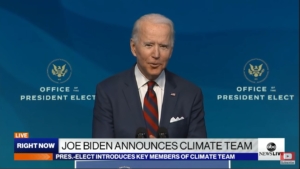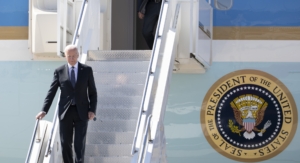Storm Warning
Here’s What You Need To Know
The angst in the lead up to this past weekend’s brush with a federal government shutdown felt different. While shutdowns always dominate conversations in Washington, this time the buzz roared in C-suites and boardrooms far beyond the Beltway. That’s because more and more sectors have embraced what President Biden’s National Security Advisor earlier this year called a “new Washington consensus” of central planning, mandates, and subsidies across a number of key economic sectors.
The shutdown near-miss is a stark reminder of how uneasy that consensus might be in a hyperpolarized, closely divided country with political institutions that often seem incapable of basic functioning. Yet, at the same time, more corporate sectors than ever hope to reap benefits from Washington-set industrial policies even as they are caught in the crosshairs of those vying for control of the very same political institutions that set those policies.
For public affairs professionals, this new reality brings greater pressure. Here’s what they need to know as they help their organizations navigate it.
Subscribe to Receive Insights
"*" indicates required fields
Boosts from industrial policy come at the cost of certainty
In the past several years, billions if not trillions of investment decisions have been driven by measures from Washington promising tax and financing incentives thanks to newly passed laws like the Infrastructure Investment and Jobs Act, CHIPS and Science Act, Inflation Reduction Act, and other similar measures. These laws heralded a new age of public-private collaboration intended to advance American economic might in what The White House calls “a modern American industrial strategy.”
Yet, as the shutdown game of chicken reminded corporate executives, this strategy relies on a house of cards buffeted by gusts of wind from the twin tides of progressivism and populism. As companies leverage these public incentives, they entrust their shareholders’ interests to the whims of slim majorities in divided, polarized government. As sharp-thinking friend of Delve Bruce Mehlman recently noted, “change is the new normal” in Washington, with the “average duration of control” cut in nearly half in the past two decades from what the country experienced last century. That means beyond the immediate question of whether the government will be funded beyond the next 45 days, companies must also anticipate the potential for future Congresses to cancel or revise the promises made by recent Congresses. For example, a Republican presidency and/or Congress in 2025 could seek to defund clean energy incentives and other funds distrusted by their political base of support – by one count, they have already attempted to do so 16 times this year.
WOE is Me (and You)
The corporate embrace of industrial policy is just one facet of what former Bush Administration official and World Bank President Robert Zoellick has termed “the Washington Ordered Economy” (WOE). While populists and progressives may have different reasons for doing so, both agree the government in Washington needs more of a say in where and how the private sector invests and grows. The White House’s “new Washington consensus,” Zoellick argues, means “Washington planning, mandates and financing” directing the economy. That’s good if your industry or investment is favored by the political winds, but costly if it is not.
Regardless of whether they are in favor at any particular political moment, a Washington-Ordered Economy might bring companies a lot of disorder thanks to the uncertainty of executive action governing how and where they can invest and operate. That’s because while executive orders and regulatory changes may align with the priorities of the current administration, take President Biden’s tightening of EV tax credits for example, they can also be subject to legal challenges and potential reversal by future administrations. This unpredictability can make it exceptionally challenging for businesses to formulate long-term strategic decisions and investments, as they must navigate a landscape where the rules, at both the federal and state levels, are susceptible to shifts in political direction.
Spring and Summer 2023 Was Just a Preview. Get Ready for the Main Event.
The government shutdown drama is not happening in a vacuum, but within the broader politicization of commerce, both in our Nation’s Capital and across the nation. An expanding array of policymakers and stakeholders fervently expect companies and industries to bend to their particular views on today’s policy, politics, and culture. The Bud Light and Target controversies earlier this year offered a glimpse of how these challenges can rapidly escalate.
While polarization in Washington breeds gridlock and uncertainty for businesses, polarization across states is accelerating the policy gap between red and blue states. In 2023, single party control of states reached a new high, with 140 million Americans living under Democratic control and nearly as many under Republican control. Such domination by one party in state government mean fewer checks on partisan excesses, straining businesses’ ability to straddle the growing policy gap on a broadening range of issues, including fossil fuels and e-commerce.
2024 Will Only Up the Ante – How Are You Getting Prepared?
This new environment is not a fleeting disturbance; it’s a permanent fixture for now . A discernible shift has occurred in how politicians and regulators harness businesses as tools to advance their partisan agendas. The truth is skepticism, scrutiny, and unrelenting pressure will continue to mount, placing businesses at an even greater risk of becoming collateral damage in the political battles of our time. As the 2024 election season gains momentum up and down the ballot, the question is not whether this storm will persist but how well-prepared businesses will be to weather it.
Taking a stand or choosing neutrality can alienate critical policymakers and stakeholders with divergent views. Sustaining trust amid those pressures requires unwavering effort and vigilance amidst growing politicization. Businesses must urgently assess upcoming risks and stay aware of all influencing factors to avoid severe reputational and financial damage in this highly politicized, high-stakes environment. To avoid this damage, public affairs professionals need a playbook to stay ahead. Here at Delve, we are already helping public affairs professionals build their playbooks to ensure they are ready to engage smartly and proactively as the 2024 legislative and political season draws closer.



